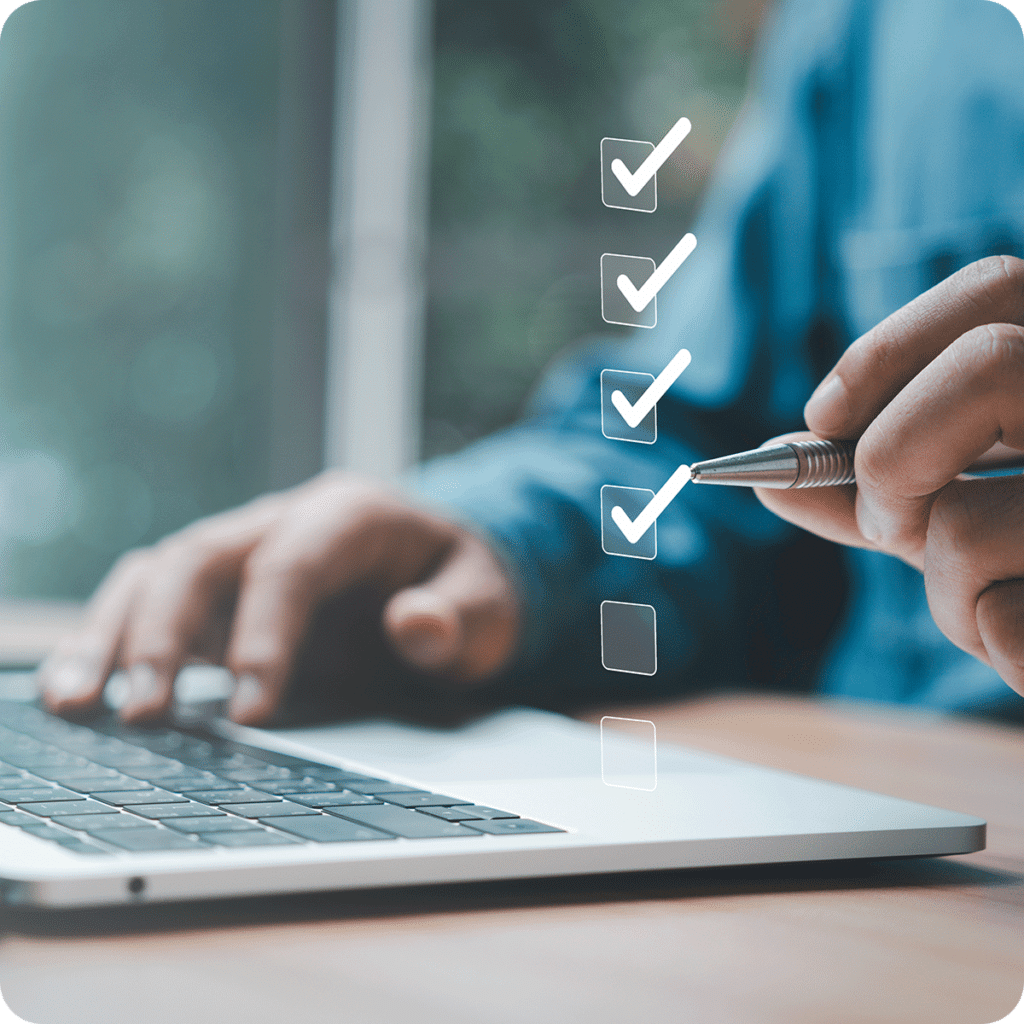Electronic invoicing platform
Looking for an electronic invoicing solution to digitize your invoice management processes? Artéva offers you a complete solution, directly operational.

What is an e-invoicing platform?
An electronic invoicing platform is an automated service for processing and archiving invoices. This dematerialization process centralizes the processing of your invoices on a single platform, especially useful if you have several billing systems or if you combine several transmission/ reception modes.
This dematerialization process applies to both customer and supplier invoices, facilitating the management and traceability of commercial transactions and allowing significant financial gains due to the automation of processes.
The benefits of conducting an electronic invoicing project for your company
Adopting e-invoicing for your business opens the way to strategic advantages to grow your revenue, while improving your cash management and benefiting from a strengthened budget control.
Achieve financial savings by eliminating paper processing and automating processes
This improvement allows for savings by eliminating associated costs while reducing the ecological footprint.
Improve relationships with your customers and suppliers
This transition promotes more efficient and transparent collaboration, benefiting all trading partners.
Refocus your teams on their value-added missions
This optimization of human resources promotes innovation and growth in your company. Teams can focus more on high value added tasks.
Gain in flexibility, speed and reliability
These benefits boost financial and operational management through increased flexibility, improved speed, and enhanced reliability.
Benefit from better regulatory compliance
The management and archiving of tax documents is essential to ensure transparency and security of financial transactions, to ensure compliance.
To see these benefits in action
Call on our experts to discuss your bill dematerialization projects.

Orchestrade®, the e-invoicing platform for businesses
The current tax reform aims to digitise and modernise tax processes, in particular to increase transparency and reduce fraud. Electronic invoicing is a key element of this reform.
The dematerialization of purchase invoices and the implementation of an automated validation workflow are crucial steps to modernize the financial and administrative management of companies. This process reduces costs, improves efficiency and ensures better compliance with tax regulations.
Dematerialize sales invoices, combined with precise traceability of processing steps and omni-channel and multi-channel transmissionformats, represents a major step forward for companies seeking to improve their operational efficiency.
Digitize your billing process with Artéva
The Orchestrade® solution from Artéva, digitizes your supplier and customer billing cycles according to your needs. We support all your e-invoicing projects, without technological constraints.
Electronic invoicing supplier
Improved management of supplier invoices to reduce processing costs and strengthen collaboration with suppliers.
Electronic customer invoicing
Simplification of invoice sending and debt management. It enhances customer satisfaction and the efficiency of business transaction processing, while reducing payment delays.
Public sphere – Chorus pro
Checking and transmitting invoices and reporting life cycle status. Since 1 January 2027, all invoices for public bodies must be filed on the Chorus Pro platform.
SDI
Compliance with legal obligations on electronic invoicing with companies and individuals in Italy. Since 1 January 2019, all invoices issued from the Italian territory must pass through the SDI platform.
Everything you need to know about e-invoicing
Through this FAQ, explore all the essential questions that will guide you through the world of electronic invoicing.
Evaluate your billing management needs and search for the solution through Artéva services, offering functionalities adapted to your business. Then compare the options available in terms of security and usability for your team.
With mandatory electronic invoicing coming into force in September 2026, companies must adapt their processes to ensure a smooth and compliant transition. The first step is to analyze the impact of the reform on invoicing flows and identify the necessary adjustments. Then, it is essential to choose a suitable solution, by opting for a Partner Dematerialization Platform (PDP), capable of managing standard formats such as Factur-X, UBL or CII. It is also crucial to involve and train teams, particularly accounting and financial departments, so that they master the new tools and processes. Anticipating costs and resources is another key step: this includes investment in software, training and support from a specialized service provider if necessary. Finally, a test phase must be set up before the deadline, to identify possible adjustments and ensure smooth integration with partners.
As of January 1, 2025, over 80 PDPs have been conditionally registered by the French tax authorities. The full list of registered platforms is available on the official French tax website. PDP selection criteria When choosing a Partner Dematerialization Platform, it's essential to take several factors into account:
- Interoperability and portability of flows: seamless integration with existing business processes and compatibility with business partners, with no break in the transition.
- Non-reform invoice processing: support of documents via EDI or OCR/Video-coding to ensure complete management.
- Data security: ISO 27001 certification, data hosted on a secure server in France, and exchange protection via advanced encryption protocols.
- Formats supported: compatibility with all reform formats (Factur-X, UBL, CII) to ensure issuance in accordance with the format your customer may require, as well as support for specific formats.
The PPF (Public Billing Portal) is managed by the State, its role evolved in October 2024. Initially intended to offer a public platform for issuing and receiving electronic invoices, it now focuses on two main missions: being a central directory to identify the PDPs used by companies and a data concentrator responsible for transmitting essential information to the tax administration. Its role is therefore no longer operational for the direct exchange of invoices between companies. PDPs are private Partner Dematerialization Platforms registered by tax bodies acting as trusted third parties. They play an intermediary role by transmitting dematerialized invoices between suppliers and customers, while extracting crucial data for the tax administration. Finally, ODs are dematerialization service providers who support companies in the transition to electronic invoicing. They ensure the conversion of documents, archiving and integration of invoicing flows. However, ODs are not directly connected to the tax administration and must rely on a PDP for the reception or issuance of invoices and invoicing data. In summary, the PPF makes it possible to identify the PDPs associated with the Companies and centralizes and transmits the tax data to the administration, the PDPs manage the exchange of invoices and guarantee their compliance, and the ODs offer additional services in support of the companies. This structuring makes it possible to optimize the management of electronic invoices and to ensure a smooth transition towards the total dematerialization of B2B exchanges.
The reform of electronic invoicing introduced by the Finance Act provides for a gradual implementation depending on the size of companies subject to VAT in France. From 1 September 2026, all companies must be able to receive electronic invoices, regardless of their size. This date also marks the start of the obligation to issue for large companies and mid-sized companies (ETIs). Then, from 1 September 2027, the obligation to issue will be extended to all companies, including SMEs, VSEs and micro-enterprises. The e-reporting obligation (the declaration by the taxable person of transactions that have not been the subject of electronic invoicing) follows the same timetable as for the obligation to issue. This reform aims to combat VAT fraud and simplify companies' reporting obligations by automating the transmission of tax data. It also helps improve the traceability of transactions and optimize accounting management through the dematerialization and interoperability of systems.
Yes, electronic invoicing is gradually becoming mandatory for French companies subject to VAT. The 2020 Finance Act initiated this transition in order to modernize commercial exchanges and strengthen tax traceability. From September 1, 2026, all companies must be able to receive electronic invoices via a Partner Dematerialization Platform (PDP). The issuance obligation, for its part, will be implemented gradually according to the size of the companies: - September 1, 2026: issuance obligation for large companies and ETIs. - September 1, 2027: issuance obligation for SMEs and micro-enterprises. The reform of electronic invoicing in France aims to combat VAT fraud and simplify the reporting obligations of companies by automating the transmission of tax data. It also helps improve the traceability of transactions and optimize accounting management through the dematerialization and interoperability of systems.

Orchestrade®, a solution published by Artéva
Designed specifically for companies looking to make their digital transformation, Orchestrade® is a B2B data exchange platform available in SaaS mode.
We optimize your invoice exchanges by dematerializing your processes for managing suppliers and customers. Positioned as both a dematerialization operator and a dematerialization platform partner, Artéva has a complete solution to support you.
Schedule your appointment
Request a custom demo
Discover how the Artéva experts can support you: from integration to solution management, with a personalized service.


